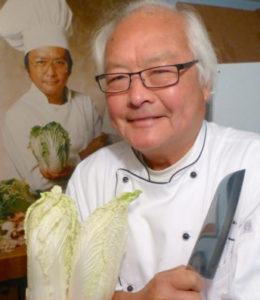Wok & Roll by Peter Kwong, (Frederic) Inter-County Leader
» Download this column as a Word document
I’ve been studying and practicing Buddhism for some time now. Unlike popular beliefs, Buddhism is not a religion; it is just a philosophy that discusses simple issues of life — giving birth, growing old, getting sick, and dying.
It is a journey that none of us can avoid. Yet, we can choose the path of how to travel our own journey. I never want to discuss politics or religion with others, as everyone has their own opinions. So yes, I practice and study Buddhism; but no burning incense and no chanting or bell ringing. Just a lot of reading and meditating on my own.
There is this “Heart Sutra” that I read every morning before I start my day. Would you believe that the sutra was written around the seventh or eighth century? Goodness, that was 12 centuries (1,200 years) ago.

During the T’ang Dynasty (eighth century A.D.) the emperor sent a monk, Xuanzang, to India to obtain more Buddhist preaching. The appointed monk traveled on foot across China, central Asia, through the deserted lands and high mountains, and finally got to the destination — India, where Buddha was born. It took him three long years to accomplish that. The hardship of the journey inspired a writer, who many years later wrote the famous “Journey to the West” (Story of the Monkey King).
In the few short years in India, not only did Xuanzang learn the language fluently but he also could translate the scripture from Indian to Chinese, and managed to bring hundreds and thousands of scrolls of the translations back to China. The emperor was most delighted and he gave the monk the highest honor by giving him the official name of T’ang. Hence, instead of his birth name Chan, his new name was T’ang Xuanzang. What an honor indeed.
Just like the preaching of Jesus, which was written in the native dialect first and was later translated to English, the Sutra had the same destiny. Can you imagine how painful it was to translate the old Indian language to old Chinese first, and after many years, it surfaced again in modern Chinese language?
I read the Sutra many, many times and just couldn’t figure out what it was all about. There was no point in trying to figure out the ancient Chinese translation, as many quotes are from the Indian scripts.
After many tries, I figured my very own script of the Heart Sutra. It is not official by any means, but it is my own interpretation. We all look at the same object and we may all come up with our own interpretations. So, who’s wrong and who’s right?
I remember the fable of seven blind men who were led to an elephant and each was asked to describe his perception of the animal. One was led to experience the trunk, one the ear, one the tusk, one the foot, one the tail, one the stomach and one the head. So, with the same animal, there were seven different descriptions of just what the animal was like.
And just imagine how the arguments can continue for days. Each was absolutely right and telling the truth. But just what was the truth? An eternal question that lingers over our heads for thousands of years. Just what is the truth?
So, here is my interpretation of the Heart Sutra:
We humans are the masters of all species. We can think and ponder, we can analyze difficult situations, we have feelings and we can dream. But then, there’s where all the troubles and heartaches began. After understanding the difference of what is black and white, right and wrong and the difference between being rich and being poor, we will begin to become prejudiced and form our own opinions.
When we have feelings, we will encounter emotions of happiness, anger, sadness and joy. And that’s when the temptations of greed develop. We begin an urge to possess materials that we don’t have. And we always want more afterward. However, the more we gather, the more we worry that we will lose them all one day. Hence, we will be living in fear and anxiety forever, is that what life is about?
If our heart is like a bowl of still water, with no interference and worries, then where do the worries come from? What we see or hear in our lifetime, actually they don’t really exist. It’s just an illusion. Come to think of it, even if we live our lives over and over for a hundred years, a thousand years, or a million and more years, in eternity, it is just a blink of an eye. Our past, present and future all exist in the same time zone. So, in which time zone are we living?
I love to study the galaxies around our own universe, to realize just how small our earth is when compared to these billions and billions of galaxies around us. In a sense, what is eternity? And how do we fit into this scheme of eternity?
Our lifetime is considered rare if we live for over 100 years. So, what is 100 years old when compared to 1,000,000 years old? Or more, 100,000,000,000 years old? Mind-boggling, isn’t it?
Somehow, the Heart Sutra explains that we do not really exist in this eternal life — we are but a speck of dust in the wind of eternity. So, does it matter then, if our existence matters at all?
In a sense, we do matter. We should do our best to make sure that during our existence, we do our best to ensure that our world around us is peaceful, calm and in harmony. And we should do our best to ensure that our existing world should be void of hate, agony, sadness and anger.
Sounds a lot like Jesus’ preaching, doesn’t it? I can’t help but smile. As when Jesus disappeared for many years from the scriptures, rumors are that he went to India and studied the Buddhism preaching, and came up with many quotes from the Buddhist practice.
To me, as long as the quotes are to become a better person and to make the world a better place, where people are harmonious with each other and live peacefully with each other; I am all for it.
“Yes, I have become the world and the universe and it is my responsibility to make sure that it is a better place for everyone. That’s what my heart wants to do and that’s where it will rest.”
Wouldn’t it be wonderful if we all did what we can to make this world a better place?



